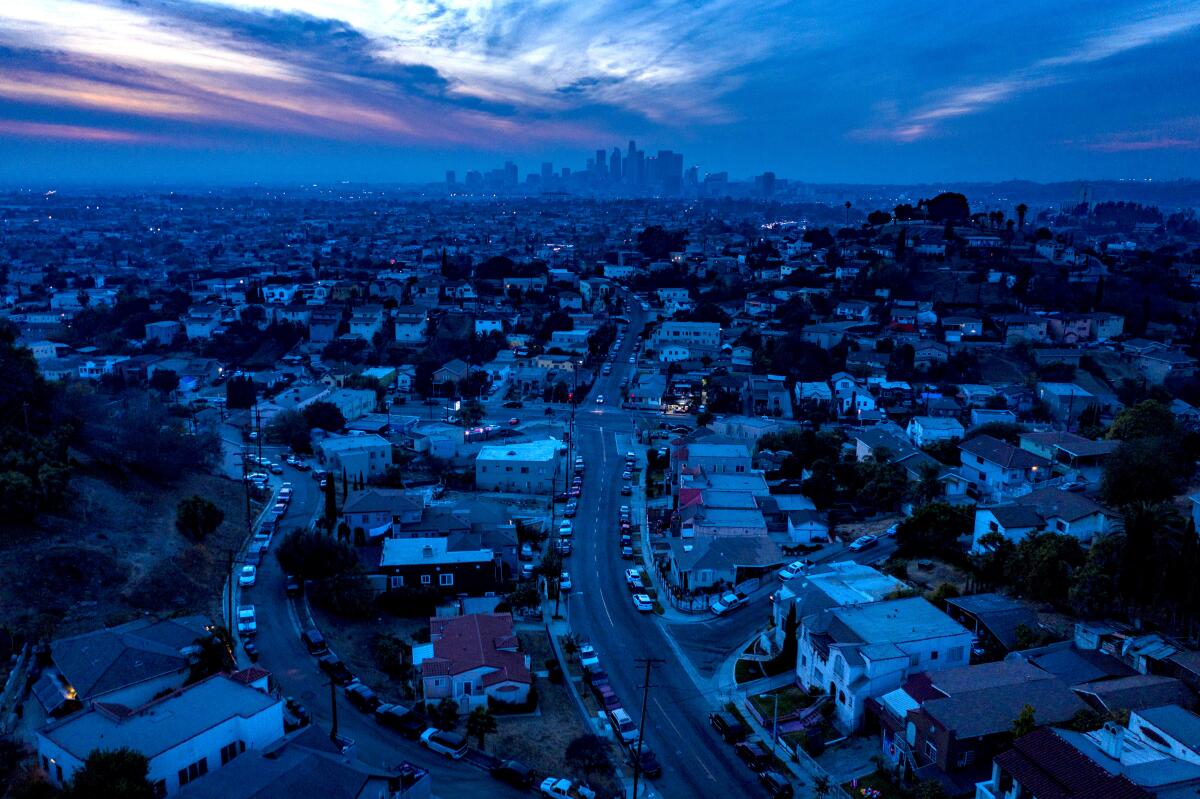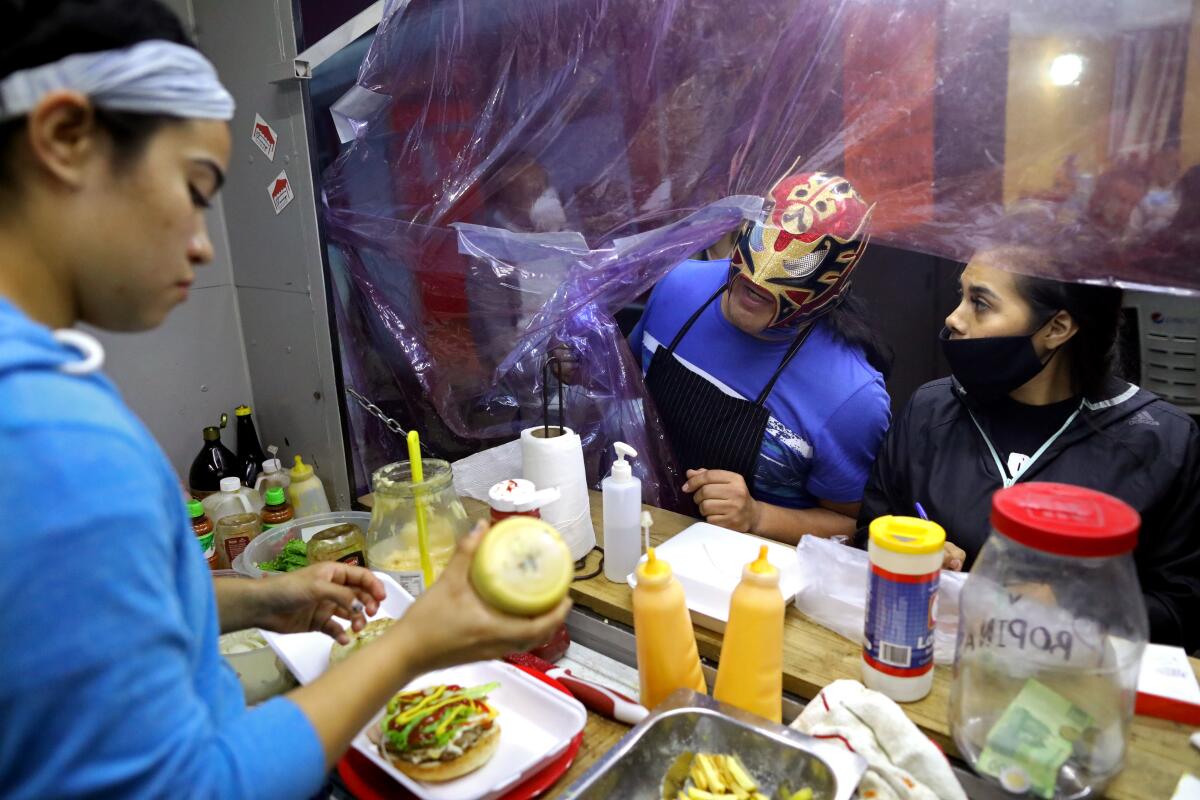Latinx Files: As 2020 comes to end, a time for reflection and hope

- Share via
By this time tomorrow, 2020 will be no more. Congratulations, you made it! No joke, you should feel a sense of pride and accomplishment for enduring a global pandemic, economic uncertainty and a racial reckoning that harkened back to the 1960s.
You dealt with the loneliness that comes from doing the right thing. You were separated from your families on holidays, you celebrated birthdays over Zoom. Some of us had to FaceTime family from hospital beds. You just wanted a hug from a loved one.
You also survived the presidential election. Remember that?
But while this year might be coming to a close, the COVID-19 pandemic is nowhere near over. It might be tempting to think that it is, given the good news on the vaccines, but the reality is that December was California’s worst month yet and January isn’t looking any better. The same scenario appears to be playing out in Texas and Florida.
The Latinx community continues to be disproportionately affected by the pandemic. I was reminded yet again of this harsh truth when reading this story by Marisa Gerber, Andrea Castillo, Julia Barajas and Andrew J. Campa, who reported out of East Los Angeles, one of the largest Latinx enclaves in America and a COVID-19 hotspot where 1 in 10 people have tested positive for the virus.
The Latinx experience chronicled
Get the Latinx Files newsletter for stories that capture the multitudes within our communities.
You may occasionally receive promotional content from the Los Angeles Times.
What my colleagues found was lives upended and scarred by ongoing trauma and uncertainty.
“They just see a number or a statistic,” Magda Maldonado, a funeral home director who has seen the human cost firsthand, said of those who dismiss the severity of the coronavirus. “But I get to see the pain. I get to see the broken families.”
In one week, four of Maldonado’s own employees lost family members to COVID-19.
My colleagues also spoke to Paloma Yanez, whose family has been spared of infection but not of the economic devastation caused by the coronavirus. Her husband’s hours were cut in September after returning to work from disability and the family has had to rely on their church’s food pantry to survive.
“It’s just been a struggle, you know?” she said. “We’re behind on most bills. I can’t work because of my illnesses and we’re just barely getting by. It’s tough, but we have faith things will get better.”
I find comfort in that last line. She’s right. It is tough, but things will get better. This too shall pass. There’s already some evidence of this being the case. There’s finally a vaccine and while the rollout has been bungled and slow, it’s likely that many Latinxs will be given priority because many of us lucky to be employed are considered essential workers. If you’re given the opportunity to be vaccinated, don’t have a preexisting condition that would cause a severe allergic reaction, and you care for the greater good, please take it. As my colleague Brittny Mejia reported, it is imperative that Latinxs take the vaccine.
And people will finally start getting their stimulus checks after months of congressional inaction. It’s nowhere near enough, but the direct deposit should hit any day now.
Until we are clear of the pandemic, wear your masks and keep social distancing. The best way we can make sure 2021 will be a better year than 2020 is through harm reduction.
For updates every weekday, sign up for Coronavirus Today, a special edition of The Times’ Health and Science newsletter.
Consider subscribing to the Los Angeles Times
Your support helps us deliver the news that matters most. Become a subscriber.
Things we’ve read in 2020 that we think you should read
• Aug. 29 marked the 50th anniversary of the Chicano Moratorium, which began as a peaceful march calling for an end to the Vietnam War — Mexican American soldiers were being disproportionately killed in action — but turned violent shortly after the arrival of law enforcement. A group of Times journalists collaborated to bring you this in-depth examination of the legacy of the Chicano Moratorium. We even made a zine!
• In 1984, the Los Angeles Times was awarded the Pulitzer Prize for Public Service, journalism’s highest award, for a series of stories on Southern California’s Latinx community. It was groundbreaking work, showing then what we still have to reiterate: We are not a monolith. The Mexican American journalists who worked on the series became the first Latinxs to win a Pulitzer. The series was digitized in its entirety this summer by my colleagues Denise Florez and Christian Orozco, and myself. I can honestly say that helping preserve an important part of this paper’s legacy has been one of the most fulfilling things I’ve done in my career, and that this newsletter is only possible because of the work of those trailblazers. Do yourself a favor and read every single story. Though they were written more than 30 years ago, they still feel timely.
• Every so often, you’ll come across a headline so good, you just know the story will not disappoint. My colleague Kate Linthicum’s report on Mexico’s top luchadores struggling because of the pandemic very much falls in this category — it’s called “In the ring, they were gods. Now the coronavirus is forcing lucha libre stars to sell street food.” Also worthy of note is the amazing photography by my colleague Gary Coronado that accompanies this story. I’m obsessed with this photo.

• Frequent Los Angeles Times contributor Carlos Aguilar (his recent retrospective on the 20th anniversary of “Amores Perros” is a must read) put together this list for Hispanic Heritage Month of 20 essential films made since 2000 that center the American Latinx experience. It’s a wonderful primer on Latinx cinema, and it’s also a stark reminder of how uninterested Hollywood is in telling our stories despite what it claims. With the exceptions of “Spider-Man: Into the Spiderverse” and “Spy Kids,” every film on this list is an independent production.
• Benito Antonio Martínez Ocasio, better known as Bad Bunny, has to be at the top of the very short list of “people who thrived in 2020.” He kicked off his year with a guest appearance in the Super Bowl halftime show, released three albums (“YHLQMDLG,” the mixtape “Las que no iban a salir” and “El Último Tour del Mundo”) and even managed to make Crocs cool. Much was written about el conejo malo over the last 12 months, but my favorite story is this Rolling Stone profile from May written by my now colleague Suzy Exposito, which captures the inner workings of the trap superstar in lockdown.
And if you want to let Bad Bunny ring in your 2021, you should definitely do what this tweet suggests:
• TikTok was 2020’s most downloaded app, which isn’t surprising given that the world on lockdown needed something else to do besides doomscrolling. The social media platform has been a boon for influencers and content creators, as well as a tool for political sabotage and theater. It was also the backdrop to two of my favorite stories this year.
The first is this truly heartwarming report by former Times intern Tomás Mier (miss you, mijo!) on Latinx dads using TikTok to connect with their more Americanized kids, a slice of life depiction that shows older Latinos eschewing toxic machismo in favor of having an actual substantive relationship with their offspring.
The second is Laura Zornosa’s profile of Nathan Apodaca, who became a star in September after a video of himself longboarding serenely to Fleetwood Mac’s “Dreams” went viral. Apodaca’s story and viral fame have been one of the bright spots of an otherwise grim year.
• If you haven’t yet, do yourself a favor and start reading “¡Hola Papi!,” an advice column whose author John Paul Brammer describes it as a “Queer Latinx Dear Abby Huffing Poppers.” It’s hilarious, genuinely charming and extremely relatable. Start with this post in which a self-described “cool young lesbian in one of the gayest cities in the U.S.” resigns herself to being forever alone. Though he’s speaking about romantic love, Brammer’s advice to seek comfort in gratitude feels extremely universal in these trying times.
• And lastly, though certainly not least, you should read every single story linked to on this thread by the Los Angeles Times Latino Caucus Twitter account. It’s a wonderful cross-section of the vital work my Latinx colleagues do and a great reminder that you cannot tell the story of Los Angeles, of California and of this country without getting our stories right.
The best thing on the Latinternet this week: TFW you do it for your immigrant parents
Last week, Alex Padilla made history after Gov. Gavin Newsom picked him to replace Kamala Harris and become the first Latinx to represent California in the U.S. Senate. Times columnist Gustavo Arellano dubbed the appointment a bittersweet moment.
“Latinos are a plurality of California’s population — and we just got a U.S. senator?” he wrote. He has a point. Nevada, Texas, Florida, New Jersey, Colorado, New Hampshire and New Mexico all had a Latinx senator before the Golden State, which has the country’s largest Latinx population.
Though it was long overdue, it was no less inspiring to witness the moment in which Padilla found out of his appointment. I dare anyone with immigrant parents to watch this video and not cry.
If you’re a first-generation Latinx, chances are that one of the big drivers in your life is a desire to be successful in order to validate the sacrifices made by your parents. That’s definitely the case for me. It’s also true for my colleague Esmeralda Bermudez, who wrote about it back in August, and many of her readers, who chimed in with their own stories about their parents. As we jump headfirst into 2021, here’s hoping you’re able to have your own version of this moment in the coming year.
Feliz año nuevo y nos vemos en el futuro!
The Latinx experience chronicled
Get the Latinx Files newsletter for stories that capture the multitudes within our communities.
You may occasionally receive promotional content from the Los Angeles Times.







